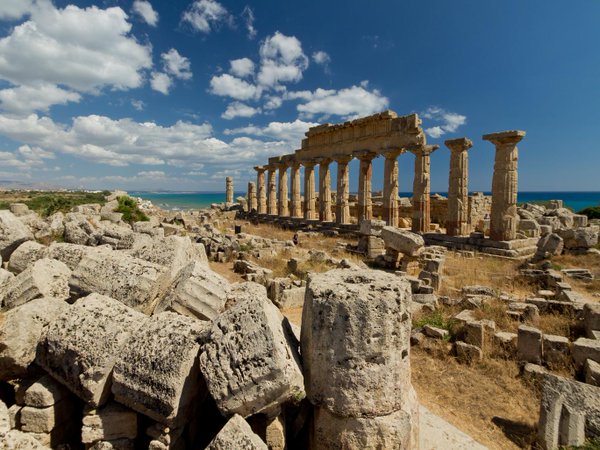Archaeologists uncover massive Greek city abandoned in ancient massacre


Archaeologists have begun an extensive excavation of the classical Greek city of Selinunte, in Sicily, where an attack by North African invaders 2,500 years ago turned the metropolis into a ghost town in a matter of hours. Hastily abandoned meals and unfired ceramics remain where they were deserted at the moment of the attack, making the city a kind of "Greek Pompeii" for researchers who are able to trace the remains back to a very small window of time, The Independent reports.
In the late 5th century BC, Carthaginian troops from modern day Tunisia massacred 16,000 residents of Selinunte and took more than 5,000 men and children as slaves, rendering the city abandoned in a short period of time. Archaeologists have discovered, for example, half-eaten meals in houses that were burnt by invaders and unfired pots and tiles that couldn't be put in the kiln before the attack. While further work is being done to determine where Selinunte shipped its pottery around the world, archaeologists already know much about the potters from the remains of their workshop and religious chapel, which was filled with working-class deities including Athena of the Workers, Artemis, Demeter, and Zeus.
What's more, because the site is nearly perfectly preserved, researchers have been able to identify 2,500 homes — previously, no one was quite sure how many houses were in a classical Greek city. Further research is being done to investigate the city's booming industry, where a manmade harbor attracted ships and trade from around the world.
The Week
Escape your echo chamber. Get the facts behind the news, plus analysis from multiple perspectives.

Sign up for The Week's Free Newsletters
From our morning news briefing to a weekly Good News Newsletter, get the best of The Week delivered directly to your inbox.
From our morning news briefing to a weekly Good News Newsletter, get the best of The Week delivered directly to your inbox.
"Selinunte is the only classical Greek city where the entire metropolis is still preserved, mainly buried under sand and earth. It therefore gives us a unique opportunity to discover how an ancient Greek city functioned," Professor Martin Bentz, the director of the current excavation, said.
A free daily email with the biggest news stories of the day – and the best features from TheWeek.com
Jeva Lange was the executive editor at TheWeek.com. She formerly served as The Week's deputy editor and culture critic. She is also a contributor to Screen Slate, and her writing has appeared in The New York Daily News, The Awl, Vice, and Gothamist, among other publications. Jeva lives in New York City. Follow her on Twitter.
-
 Why high-street coffee chains may have had their day
Why high-street coffee chains may have had their dayIn the Spotlight Rising costs of coffee, energy and payroll, plus growing appetite for luxury drinks like matcha, has caused boom in independent and speciality coffee shops
-
 GPS jamming: a new danger to civil aircraft
GPS jamming: a new danger to civil aircraftThe Explainer Use of the 'invisible threat' is on the rise
-
 'Axis of upheaval': will China summit cement new world order?
'Axis of upheaval': will China summit cement new world order?Today's Big Question Xi calls on anti-US alliance to cooperate in new China-led global system – but fault lines remain
-
 Nobody seems surprised Wagner's Prigozhin died under suspicious circumstances
Nobody seems surprised Wagner's Prigozhin died under suspicious circumstancesSpeed Read
-
 Western mountain climbers allegedly left Pakistani porter to die on K2
Western mountain climbers allegedly left Pakistani porter to die on K2Speed Read
-
 'Circular saw blades' divide controversial Rio Grande buoys installed by Texas governor
'Circular saw blades' divide controversial Rio Grande buoys installed by Texas governorSpeed Read
-
 Los Angeles city workers stage 1-day walkout over labor conditions
Los Angeles city workers stage 1-day walkout over labor conditionsSpeed Read
-
 Mega Millions jackpot climbs to an estimated $1.55 billion
Mega Millions jackpot climbs to an estimated $1.55 billionSpeed Read
-
 Bangladesh dealing with worst dengue fever outbreak on record
Bangladesh dealing with worst dengue fever outbreak on recordSpeed Read
-
 Glacial outburst flooding in Juneau destroys homes
Glacial outburst flooding in Juneau destroys homesSpeed Read
-
 Scotland seeking 'monster hunters' to search for fabled Loch Ness creature
Scotland seeking 'monster hunters' to search for fabled Loch Ness creatureSpeed Read
